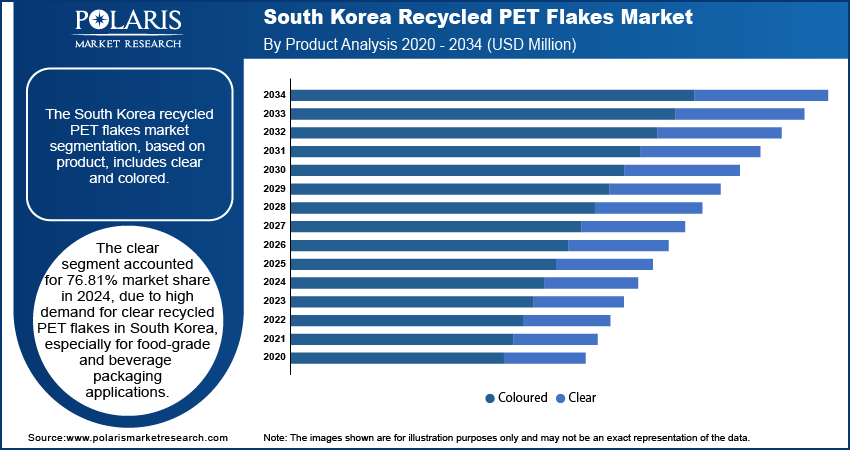The South Korea recycled PET (rPET) flakes market, valued at USD 439.59 million in 2024, is expected to grow at a CAGR of 8.1% from 2025 to 2034, with growth increasingly driven by segment-specific dynamics in end-use applications, product grades, and material specifications. As the circular economy gains momentum, the market is shifting from a commodity-based model to one defined by product differentiation, application-specific growth, and value chain optimization. The rPET flakes market is segmented primarily by purity grade—non-food-grade, food-grade, and specialty-grade—each serving distinct industrial applications with varying pricing, regulatory, and performance requirements.
Non-food-grade rPET flakes, typically derived from mixed or contaminated post-consumer bottles, are used in fiber production for textiles, carpets, and non-woven fabrics. This segment remains the largest by volume, accounting for over 60% of domestic rPET utilization. However, segment-wise performance is under pressure due to competition from virgin polyester and fluctuating fashion industry demand. Manufacturers are responding with value chain optimization, such as co-locating recycling plants with spinning mills to reduce logistics costs and improve supply reliability. Innovations in dyeability and fiber strength are also enhancing the competitiveness of rPET in technical textiles, particularly in automotive interiors and geotextiles.
Food-grade rPET flakes represent the highest-value segment, requiring advanced washing, decontamination, and SSP processes to meet Korea Food and Drug Administration (KFDA) and FDA standards. Demand for food-grade rPET is being driven by major beverage companies, including PepsiCo Korea and Lotte Chilsung, which have committed to using 50% or more recycled content in their bottles by 2030. This application-specific growth is accelerating investment in superclean recycling lines capable of achieving intrinsic viscosity (IV) levels above 0.80 dL/g, essential for bottle-to-bottle recycling. The premium pricing of food-grade flakes—often 20–30% higher than non-food-grade—provides strong incentives for processors to upgrade their facilities.
Read More @ https://www.polarismarketresearch.com/industry-analysis/south-korea-recycled-pet-flakes-market
Specialty-grade rPET, used in engineering plastics, films, and strapping, is an emerging segment with high growth potential. These applications require consistent melt flow index (MFI), thermal stability, and color clarity, driving demand for highly purified flakes. Korean firms are leveraging product differentiation through proprietary sorting algorithms and additive technologies that enhance UV resistance and mechanical properties. This segment is particularly attractive for export to high-margin markets in Europe and Japan, where sustainability regulations are stringent and brand owners prioritize traceability.
Market drivers include regulatory pressure, corporate ESG goals, and rising landfill costs. However, restraints such as inconsistent feedstock quality, high capital expenditure for food-grade lines, and competition from mechanical recycling in China limit scalability. Opportunities exist in chemical recycling via glycolysis and methanolysis, which can process mixed or colored PET waste that is unsuitable for mechanical recycling. Trends such as digital traceability, blockchain-enabled certification, and AI-driven sorting are improving transparency and efficiency across the value chain.
The competitive landscape is characterized by a mix of petrochemical giants and specialized recyclers investing in technology and compliance to capture high-margin segments.
• Lotte Chemical Corporation
• SK Geo Centric Co., Ltd.
• Korea Pulp Corporation
• Dongyang Corporation
• Hanwha Solutions
• Woongjin Co., Ltd.
• Sejong Recycling Co., Ltd.
• Korea Resources Recycling Corporation
• Daekyung Environment Co., Ltd.
• Siam Cement Group (SCG) Korea
More Trending Latest Reports By Polaris Market Research:
Cloud Kitchen Market
Asset Tokenization Market
Dental Obturators Market
Ammonia Market
Remote Weapon Station Market
Ben Oil Market
U.S. Postal Automation Systems Market
AI in Cybersecurity Market
Air Quality Monitoring Systems Market
Non-food-grade rPET flakes, typically derived from mixed or contaminated post-consumer bottles, are used in fiber production for textiles, carpets, and non-woven fabrics. This segment remains the largest by volume, accounting for over 60% of domestic rPET utilization. However, segment-wise performance is under pressure due to competition from virgin polyester and fluctuating fashion industry demand. Manufacturers are responding with value chain optimization, such as co-locating recycling plants with spinning mills to reduce logistics costs and improve supply reliability. Innovations in dyeability and fiber strength are also enhancing the competitiveness of rPET in technical textiles, particularly in automotive interiors and geotextiles.
Food-grade rPET flakes represent the highest-value segment, requiring advanced washing, decontamination, and SSP processes to meet Korea Food and Drug Administration (KFDA) and FDA standards. Demand for food-grade rPET is being driven by major beverage companies, including PepsiCo Korea and Lotte Chilsung, which have committed to using 50% or more recycled content in their bottles by 2030. This application-specific growth is accelerating investment in superclean recycling lines capable of achieving intrinsic viscosity (IV) levels above 0.80 dL/g, essential for bottle-to-bottle recycling. The premium pricing of food-grade flakes—often 20–30% higher than non-food-grade—provides strong incentives for processors to upgrade their facilities.
Read More @ https://www.polarismarketresearch.com/industry-analysis/south-korea-recycled-pet-flakes-market
Specialty-grade rPET, used in engineering plastics, films, and strapping, is an emerging segment with high growth potential. These applications require consistent melt flow index (MFI), thermal stability, and color clarity, driving demand for highly purified flakes. Korean firms are leveraging product differentiation through proprietary sorting algorithms and additive technologies that enhance UV resistance and mechanical properties. This segment is particularly attractive for export to high-margin markets in Europe and Japan, where sustainability regulations are stringent and brand owners prioritize traceability.
Market drivers include regulatory pressure, corporate ESG goals, and rising landfill costs. However, restraints such as inconsistent feedstock quality, high capital expenditure for food-grade lines, and competition from mechanical recycling in China limit scalability. Opportunities exist in chemical recycling via glycolysis and methanolysis, which can process mixed or colored PET waste that is unsuitable for mechanical recycling. Trends such as digital traceability, blockchain-enabled certification, and AI-driven sorting are improving transparency and efficiency across the value chain.
The competitive landscape is characterized by a mix of petrochemical giants and specialized recyclers investing in technology and compliance to capture high-margin segments.
• Lotte Chemical Corporation
• SK Geo Centric Co., Ltd.
• Korea Pulp Corporation
• Dongyang Corporation
• Hanwha Solutions
• Woongjin Co., Ltd.
• Sejong Recycling Co., Ltd.
• Korea Resources Recycling Corporation
• Daekyung Environment Co., Ltd.
• Siam Cement Group (SCG) Korea
More Trending Latest Reports By Polaris Market Research:
Cloud Kitchen Market
Asset Tokenization Market
Dental Obturators Market
Ammonia Market
Remote Weapon Station Market
Ben Oil Market
U.S. Postal Automation Systems Market
AI in Cybersecurity Market
Air Quality Monitoring Systems Market
The South Korea recycled PET (rPET) flakes market, valued at USD 439.59 million in 2024, is expected to grow at a CAGR of 8.1% from 2025 to 2034, with growth increasingly driven by segment-specific dynamics in end-use applications, product grades, and material specifications. As the circular economy gains momentum, the market is shifting from a commodity-based model to one defined by product differentiation, application-specific growth, and value chain optimization. The rPET flakes market is segmented primarily by purity grade—non-food-grade, food-grade, and specialty-grade—each serving distinct industrial applications with varying pricing, regulatory, and performance requirements.
Non-food-grade rPET flakes, typically derived from mixed or contaminated post-consumer bottles, are used in fiber production for textiles, carpets, and non-woven fabrics. This segment remains the largest by volume, accounting for over 60% of domestic rPET utilization. However, segment-wise performance is under pressure due to competition from virgin polyester and fluctuating fashion industry demand. Manufacturers are responding with value chain optimization, such as co-locating recycling plants with spinning mills to reduce logistics costs and improve supply reliability. Innovations in dyeability and fiber strength are also enhancing the competitiveness of rPET in technical textiles, particularly in automotive interiors and geotextiles.
Food-grade rPET flakes represent the highest-value segment, requiring advanced washing, decontamination, and SSP processes to meet Korea Food and Drug Administration (KFDA) and FDA standards. Demand for food-grade rPET is being driven by major beverage companies, including PepsiCo Korea and Lotte Chilsung, which have committed to using 50% or more recycled content in their bottles by 2030. This application-specific growth is accelerating investment in superclean recycling lines capable of achieving intrinsic viscosity (IV) levels above 0.80 dL/g, essential for bottle-to-bottle recycling. The premium pricing of food-grade flakes—often 20–30% higher than non-food-grade—provides strong incentives for processors to upgrade their facilities.
Read More @ https://www.polarismarketresearch.com/industry-analysis/south-korea-recycled-pet-flakes-market
Specialty-grade rPET, used in engineering plastics, films, and strapping, is an emerging segment with high growth potential. These applications require consistent melt flow index (MFI), thermal stability, and color clarity, driving demand for highly purified flakes. Korean firms are leveraging product differentiation through proprietary sorting algorithms and additive technologies that enhance UV resistance and mechanical properties. This segment is particularly attractive for export to high-margin markets in Europe and Japan, where sustainability regulations are stringent and brand owners prioritize traceability.
Market drivers include regulatory pressure, corporate ESG goals, and rising landfill costs. However, restraints such as inconsistent feedstock quality, high capital expenditure for food-grade lines, and competition from mechanical recycling in China limit scalability. Opportunities exist in chemical recycling via glycolysis and methanolysis, which can process mixed or colored PET waste that is unsuitable for mechanical recycling. Trends such as digital traceability, blockchain-enabled certification, and AI-driven sorting are improving transparency and efficiency across the value chain.
The competitive landscape is characterized by a mix of petrochemical giants and specialized recyclers investing in technology and compliance to capture high-margin segments.
• Lotte Chemical Corporation
• SK Geo Centric Co., Ltd.
• Korea Pulp Corporation
• Dongyang Corporation
• Hanwha Solutions
• Woongjin Co., Ltd.
• Sejong Recycling Co., Ltd.
• Korea Resources Recycling Corporation
• Daekyung Environment Co., Ltd.
• Siam Cement Group (SCG) Korea
More Trending Latest Reports By Polaris Market Research:
Cloud Kitchen Market
Asset Tokenization Market
Dental Obturators Market
Ammonia Market
Remote Weapon Station Market
Ben Oil Market
U.S. Postal Automation Systems Market
AI in Cybersecurity Market
Air Quality Monitoring Systems Market
0 التعليقات
·0 المشاركات
·140 مشاهدة
·0 معاينة



